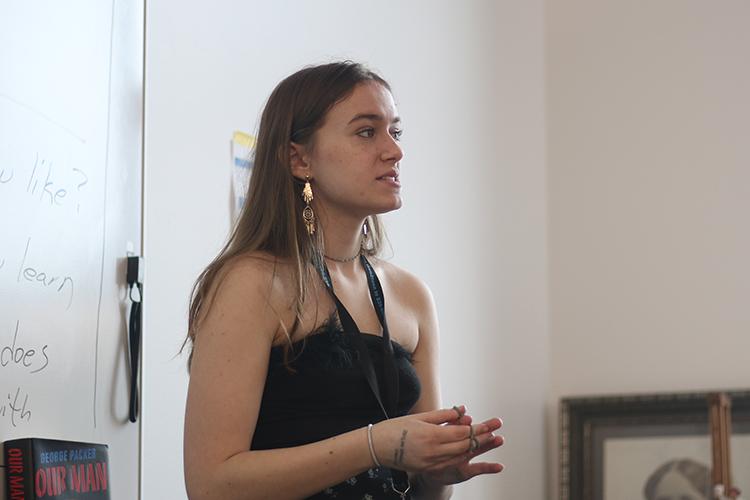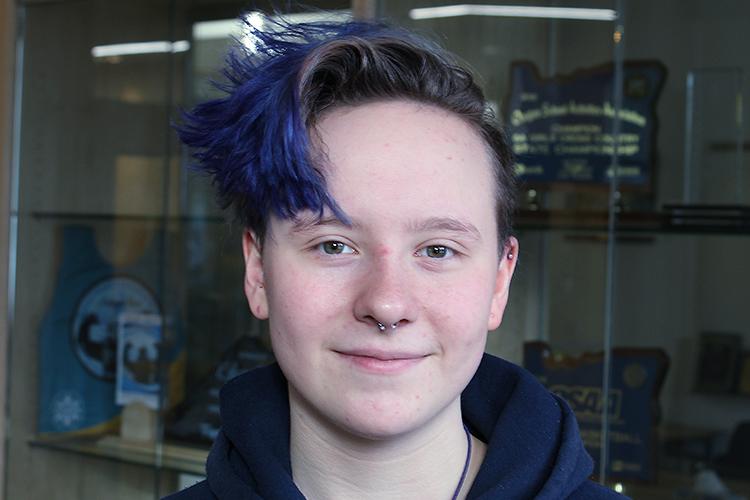 The wheels of my tricycle rattled against the worn In concrete as the warm breeze blew through my hair. The harsh light from the sun beat down on me as I pedaled slowly through the still streets of my neighborhood. The day felt ordinary.
The wheels of my tricycle rattled against the worn In concrete as the warm breeze blew through my hair. The harsh light from the sun beat down on me as I pedaled slowly through the still streets of my neighborhood. The day felt ordinary.
My eyes tracked my parents as they paced around the house. Their argument began with familiar bickering, but with each step, their voices grew louder. My heart beat fast, and my wide eyes welled with tears. I allowed them to stream down my flushed cheeks as my lips quivered. I watched as my dad threw my yellow bicycle helmet across the room, which broke its shell. My mom picked me up and scurried over to the door. We exited the house.
“We’re going for a walk,” my mom said to me, trying her best to appear poised. Hand in hand, we strolled through the neighborhood, and let the wind dry our tears. We circled the block and arrived at Mallory Meadow, the miniature park with just one swing set across the street from our house. My mom laid down in the overgrown grass. Since I was only 4, I knew my words weren’t enough to grant my mom the comfort that she desired. I rested my head on her lap and tried instead to console her with my presence.
The day my parents separated, my life shifted drastically. My mom and I drove to her publishing company on Thurman Street with no bags packed and no plan. There, we settled in the top-floor apartment.
That night, I laid awake and stared at the navy blue plaster wall. I clung to my pink teddy bear and cried into its stuffed face. I missed the comfort of my bed in the middle of my bright yellow room, and my cat Vinnie’s purrs that put me to sleep. I yearned for the security of having a place to call home.
While my temporary living space lacked a homely sensation, it gave me a front-seat view into the world of publishing. Every morning at 10:00 a.m., my mom’s co-workers trickled into work. Eager to socialize, I would race to the large art-filled rooms, where everyone worked at their computers. Watching the publishing process unfold in front of me inspired me to create work of my own.
As time progressed, I became fascinated by poetry and short stories. Having just turned 4, my reading and writing skills were limited. Determined to help me produce my own pieces, my mom rolled my favorite swivel chair to her wooden desk and sat beside me, scribing every word, sentence and phrase I uttered on her computer. She marveled over my dedication. It allowed us to bond over something we both adored.
Once satisfied with our creation, we printed it out on cardstock paper. After making a presentable collage cover with cut up magazines and glue, we would staple the pages together and create a makeshift novel.
Despite my growing passion for reading and writing, the ending of my parents’ marriage and the unfamiliar surrounding walls constantly prompted me to question my purpose.
The longer I lived on the top of the tin building, the more I found myself in a search for a sense of belonging.
Their relationship had brought me into the world. With their connection diminishing, I felt like a remnant from their past. I had yet to recognize myself as a singular person. More than anything, I felt like a burden.
As time progressed, life with my mom became easier, but we knew it was only temporary. Regardless of our comfort, we could not retreat forever. After weeks apart, the day came that I would reunite with my dad.
I watched as the sun rose that morning. Frost masked the floor-to-ceiling windows in front of my temporary bed. I wore a pink butterfly top and a pink knit skirt with striped tights. Head to toe in my favorite color, I was ready to face the part of my life that felt like it was crumbling by the minute.
Raindrops streamed down the car window. I rested my head on the cold glass and created scenarios in my head of how the hour with my dad would play out. Since I was only 4, I had never been separated from my mom, so when she dropped me off at the white and gray craftsman that I used to call home, I couldn’t help but bawl.
My dad greeted me with a weak hug. The tone of his voice when he asked me how I was doing insinuated his heartbreak. The two of us went to my room, where I was reunited with my toys. For the hour that we were together, he stood in the doorway of my room and cried. I realized my family was broken, and there was nothing that I could do to fix us. When my mom picked me up, she asked me how it went. I didn’t know how to describe our brief but emotional time together, so I replied, “Good,” and the two of us remained silent for the rest of the car ride.
Over time, we established a custody schedule. I stayed with my mom for four days a week, and my dad for three. My dad remained in our old house while my mom and I moved from the top floor of her publishing company into our first apartment.
Our 17th-floor apartment had a sprawling view of Northwest Portland. My mom used her interior design expertise to decorate each room with a character that solidified the space as ours. With decorative throw pillows and tasteful art, I felt comfortable. Every week, we ordered a Netflix DVD. They were usually romantic comedies, sometimes thrillers. Once we finished a film, we would recreate its most memorable scenes with our Flip camera. Our favorite was “The Chronicles of Narnia: The Lion, the Witch, and the Wardrobe.” We watched it three times before sending it back to Netflix. I had never seen my mom more at ease than when we worked together to create our non-professional film replicas.
Seeing the enjoyment she felt when the two of us spent time together made me never question the unconditional love she had for me. My mom contradicted the unfortunate helpless stereotype of single mothers in every way. Her perseverance provided me with a model of the type of person that I hoped to become.
Time prompted healing for my dad. It was apparent that he was learning to let go of his past marriage. However, the two of us living alone in our spacious family home became lonesome after a year. Sick of the silence, he searched for a housemate to inhabit the empty rooms.
One day he received a call from Richard, a friend he met 20 years prior. Richard informed my dad of his good friend, a mother, who was in search of a place to live. When Treva and her 10-month-old daughter Sable moved in, I watched my dad regain the contentment he had lost when my mom left. We developed a sense of familial comfort. Treva cared for me as if I were her daughter, and Sable naturally became a little sister to me.
Prior to moving in, Treva had pursued music and created a number of albums. After I vocalized my interest in guitar, she offered to give me lessons. The two of us sat with our guitars in the living room every week as Sable played with various toys. Through the time we spent together, I became closer to Treva. I began to see her as a second mother.
Just like a traditional family, Treva, Sable, my dad and I developed a routine. Every Wednesday, we went out to our favorite Thai restaurant on Alberta Street. Then, we walked to Lovely’s 50/50 for salted caramel ice cream. Before I went to sleep, I would accompany Treva and Sable for a bedtime story. Their company made my mom’s absence from the home far more bearable.
When I started kindergarten, my parents had been divorced for almost two years. During their time apart, my parents were able to recover from their separation. They learned to establish themselves as individuals, rather than a married couple. Once I began elementary school, they were forced into situations in which they were expected to converse before either of them were willing.
On my first day of school, the three of us sat at the class orientation. Still riddled with tension, the mood was uneasy. I longed to diffuse the rigidity. I grabbed their hands and squeezed them tightly.
Over time, each of their encounters unveiled a new level of friendship. They accompanied each other to every one of my piano recitals, soccer games and school events. Regardless of whether or not their romance had faded, their respect for each other as people remained clear. Their efforts to remain in each other’s lives was enough to impose a sense of familial support. We were still an unconventional family, but I was finally content with that.
When I reveal to others that my parents are divorced, their immediate response is an apology and a look of sympathy. My consistent response is, “Don’t be. I’m grateful for it.”
As normalized as divorce may be today, the word itself is associated with a multitude of negative connotations. Nonetheless, not everyone’s story is the same. Being forced into a lifestyle in which I had no specific place to call home gave me a sense of independence and individuality at a young age. Home provides a feeling of security. It is a place to reside and individualize. When forced to transport essentials from house to house every week, that feeling of home disappears. I developed security within myself because my life lacked that traditional safe haven.
Although marriage is expected to bond two people together for the rest of their lives, having witnessed the unhealthy nature that occurred during my parents’ relationship has led me to believe that by staying together any longer, their relationship would have further deteriorated before it ever had the chance to blossom into a friendship.
Divorce should be seen as an opportunity, not a failure. If my parents had never separated, I would lack qualities about myself that I strongly value.
Today, my understanding of myself as an individual is concrete. Now, wherever I am and whoever I am with, I feel secure with who I am.








































